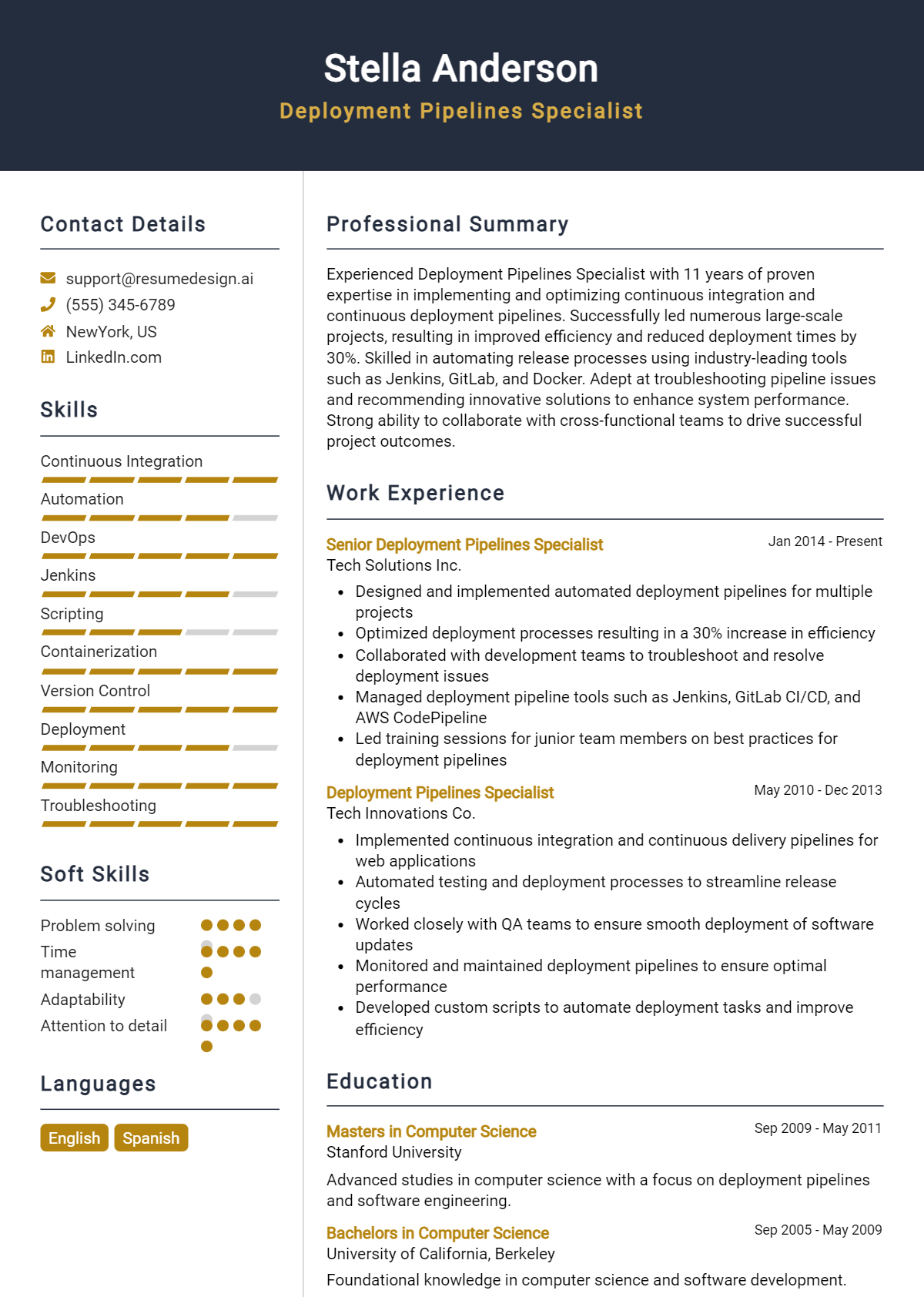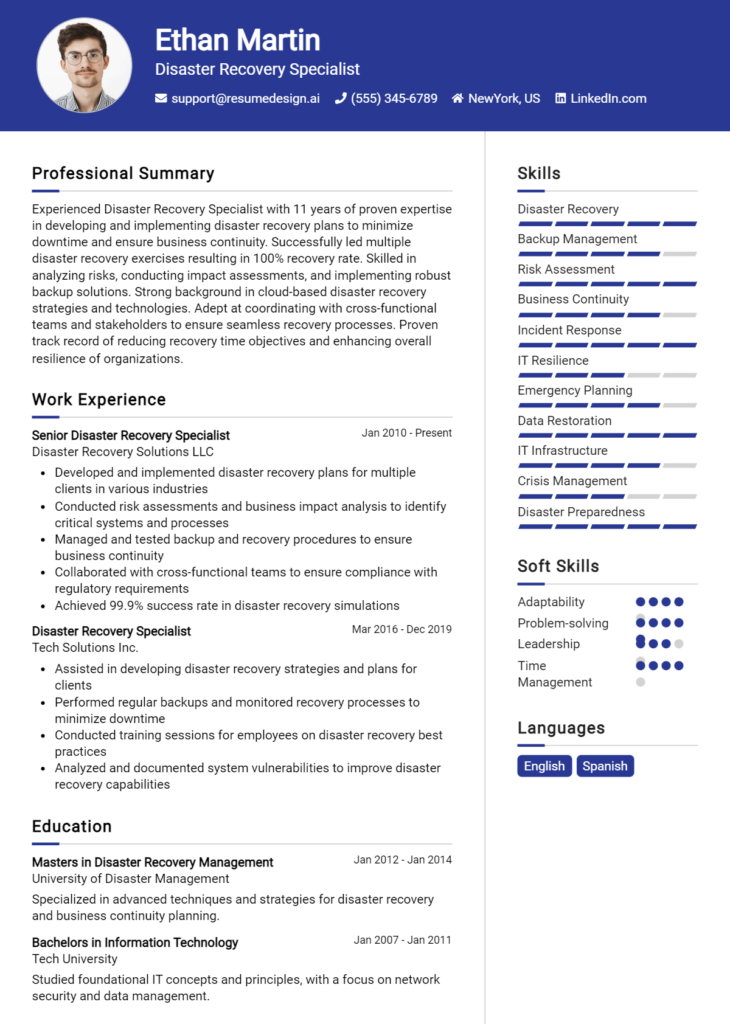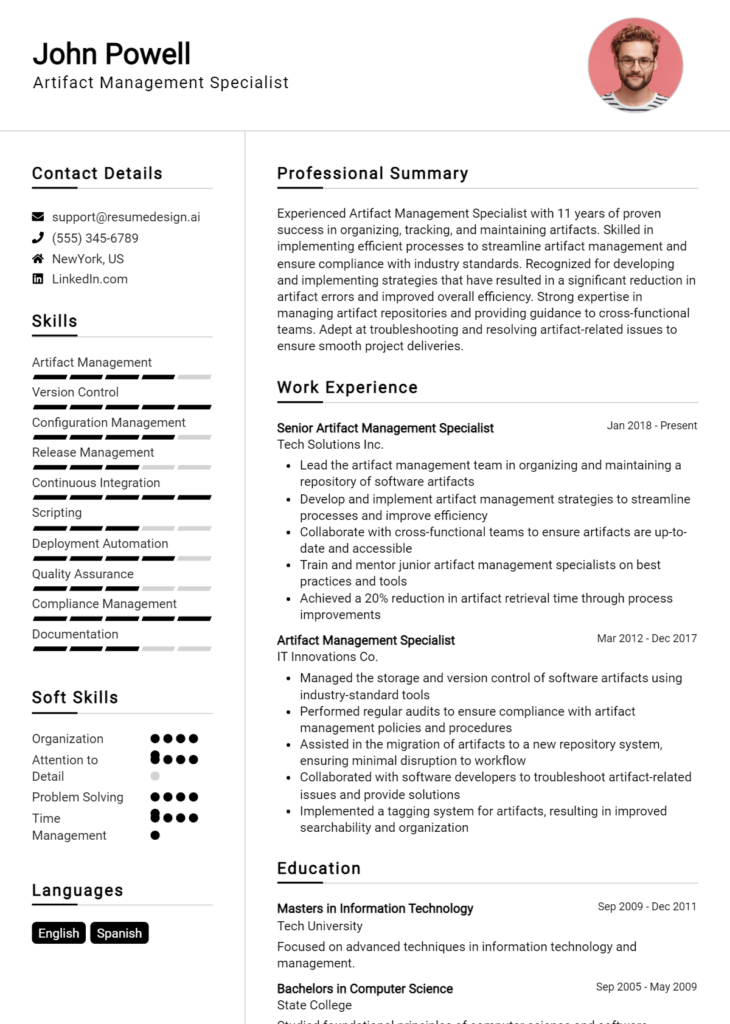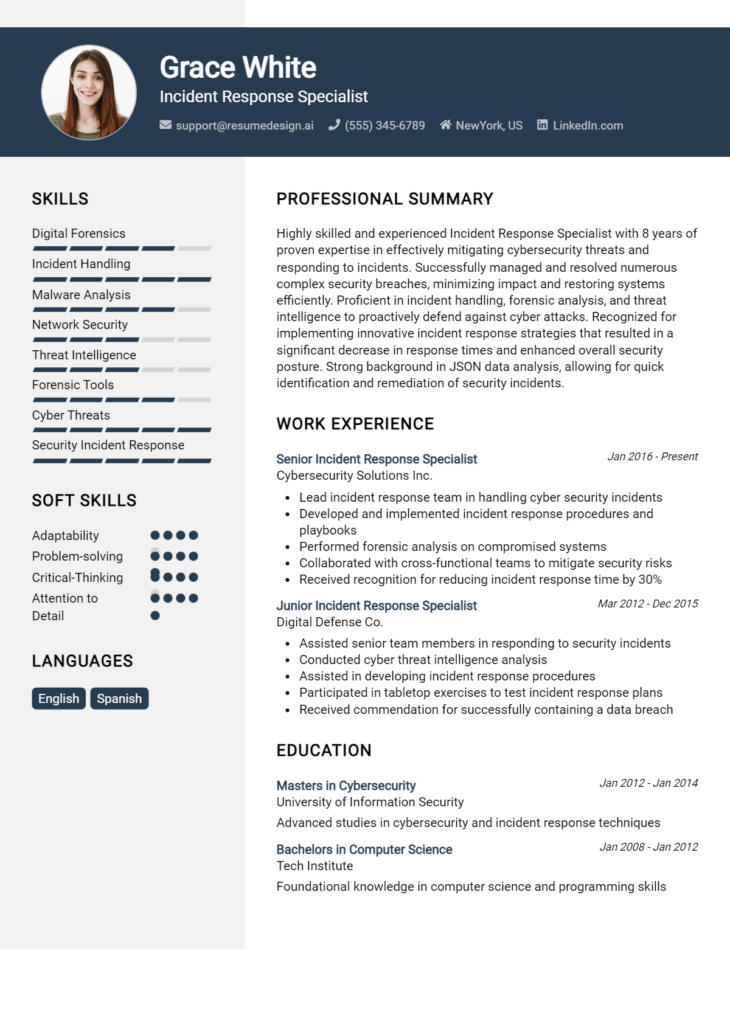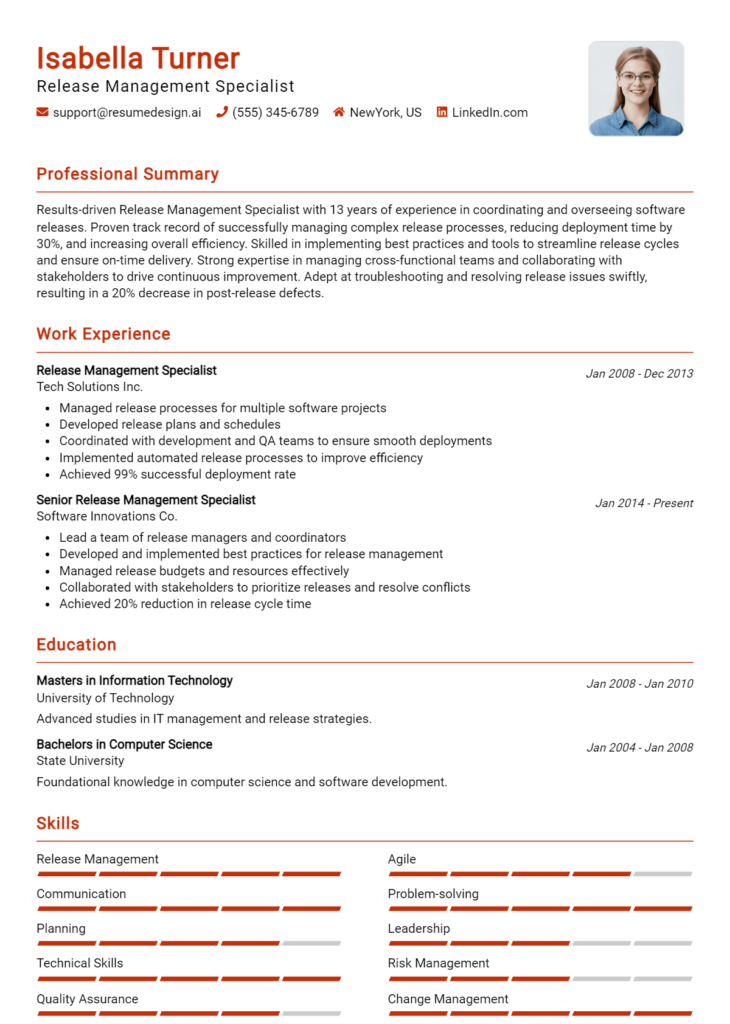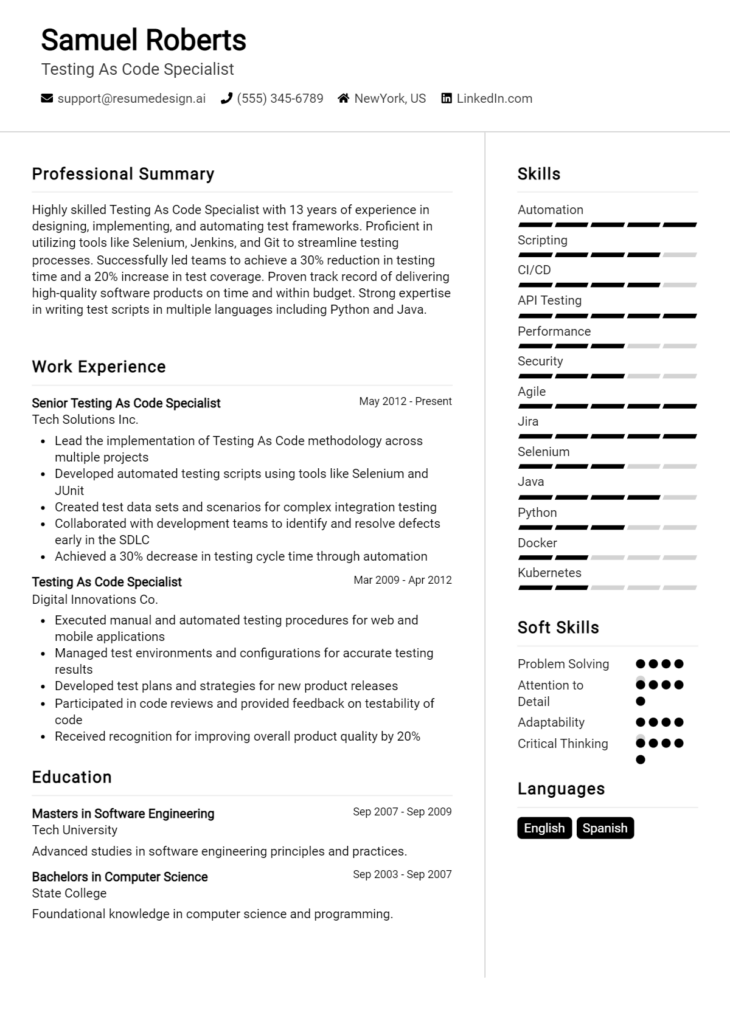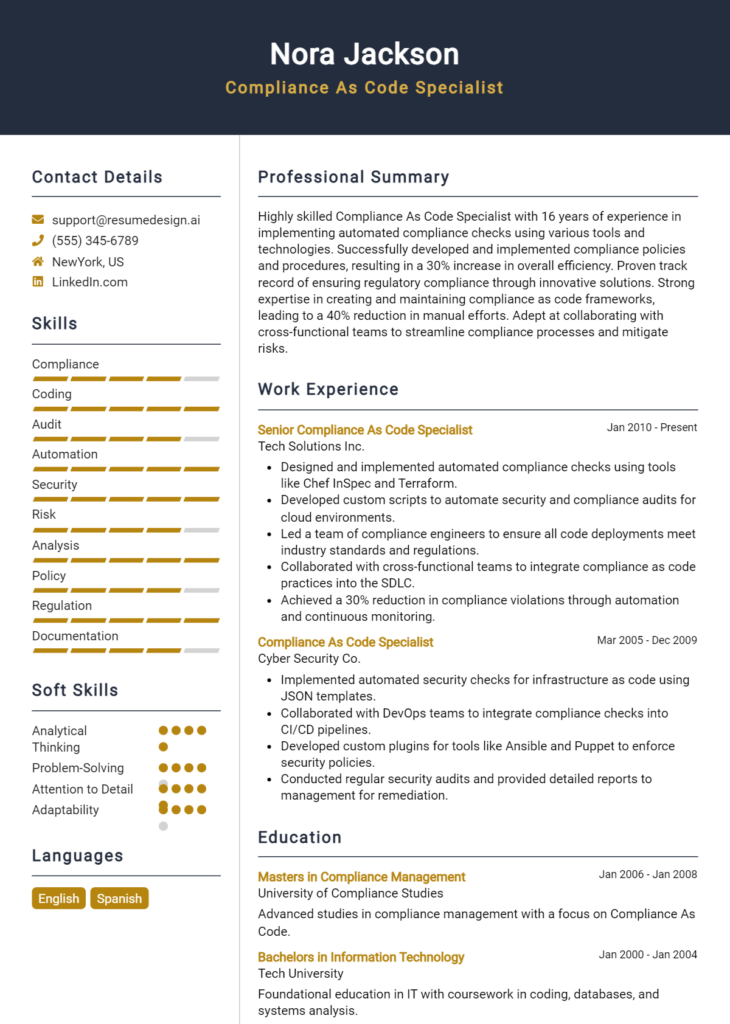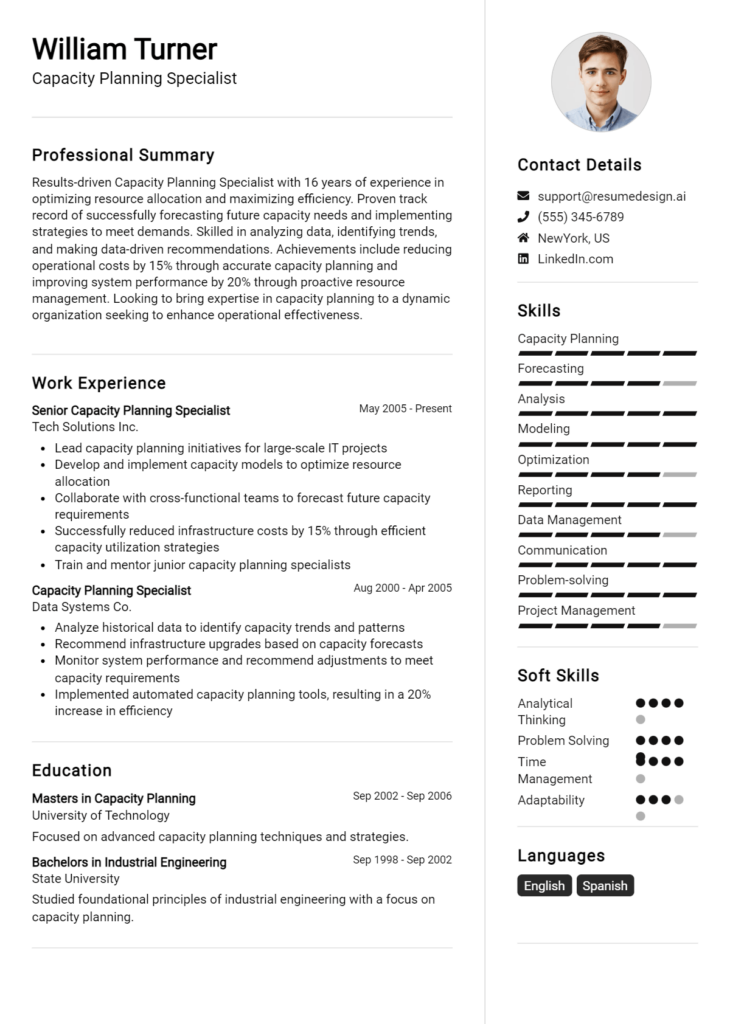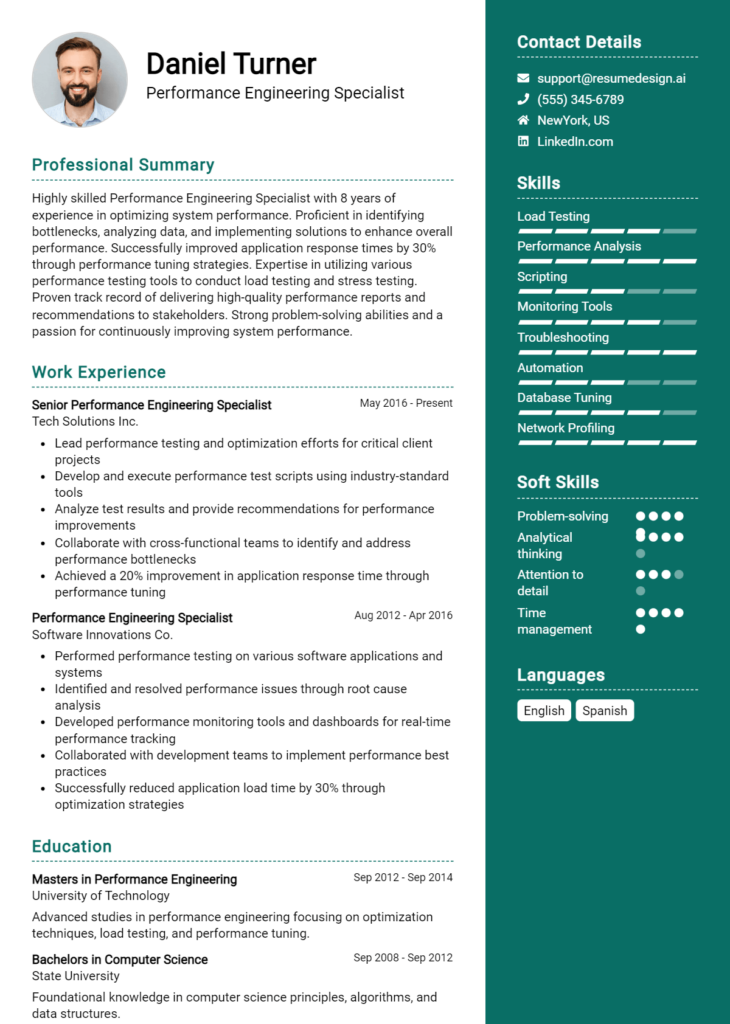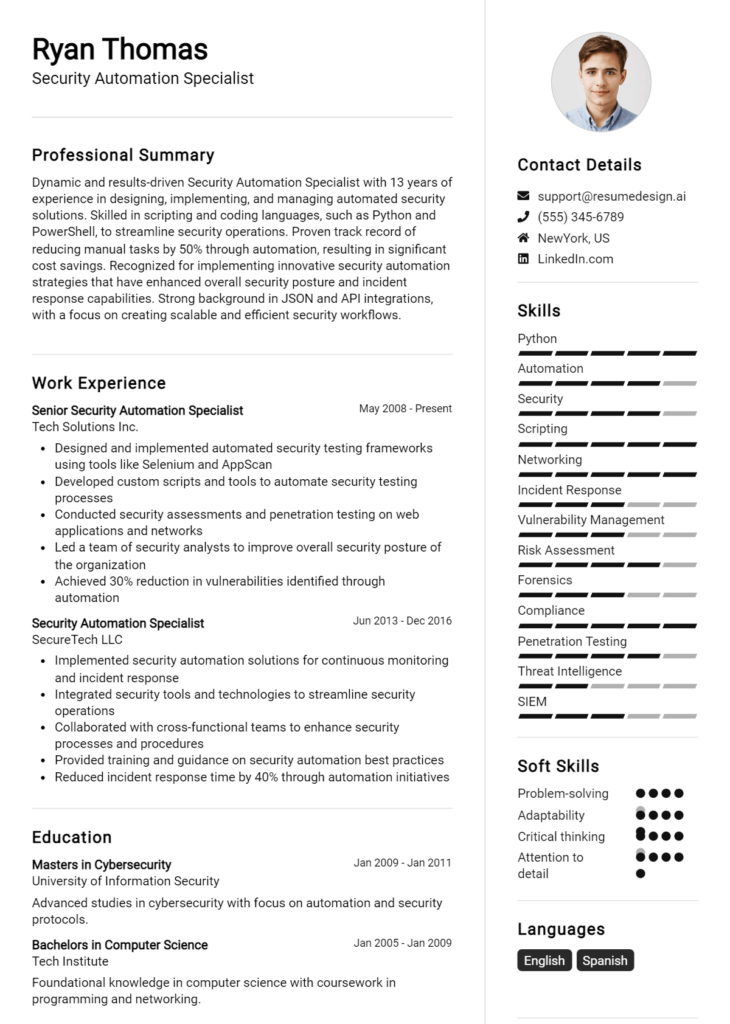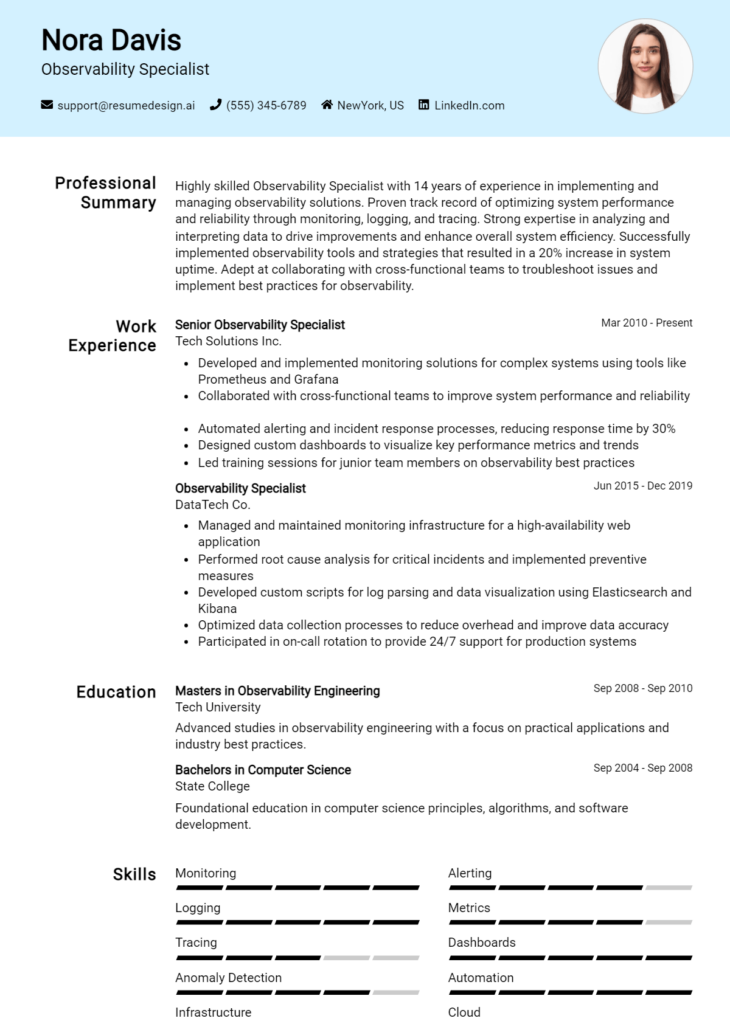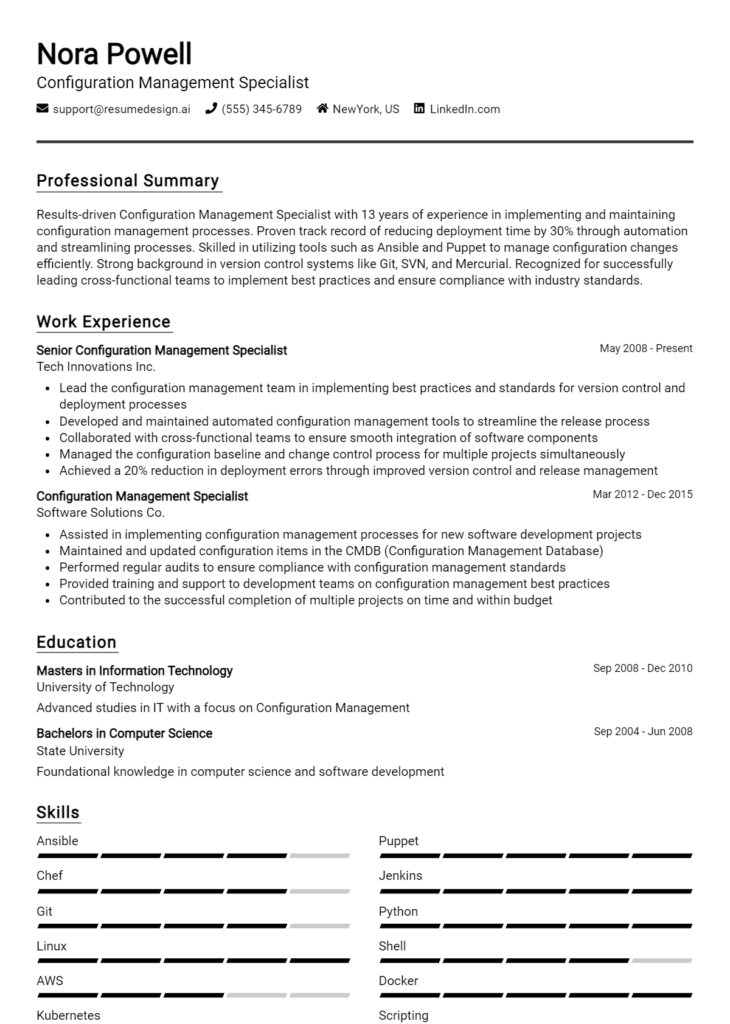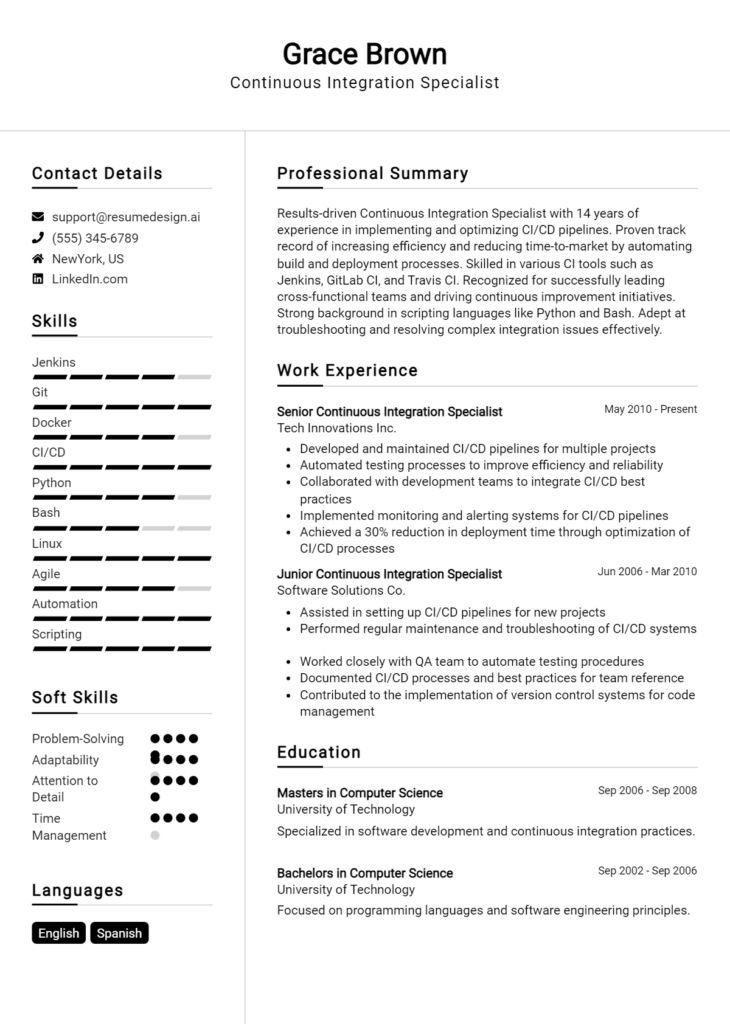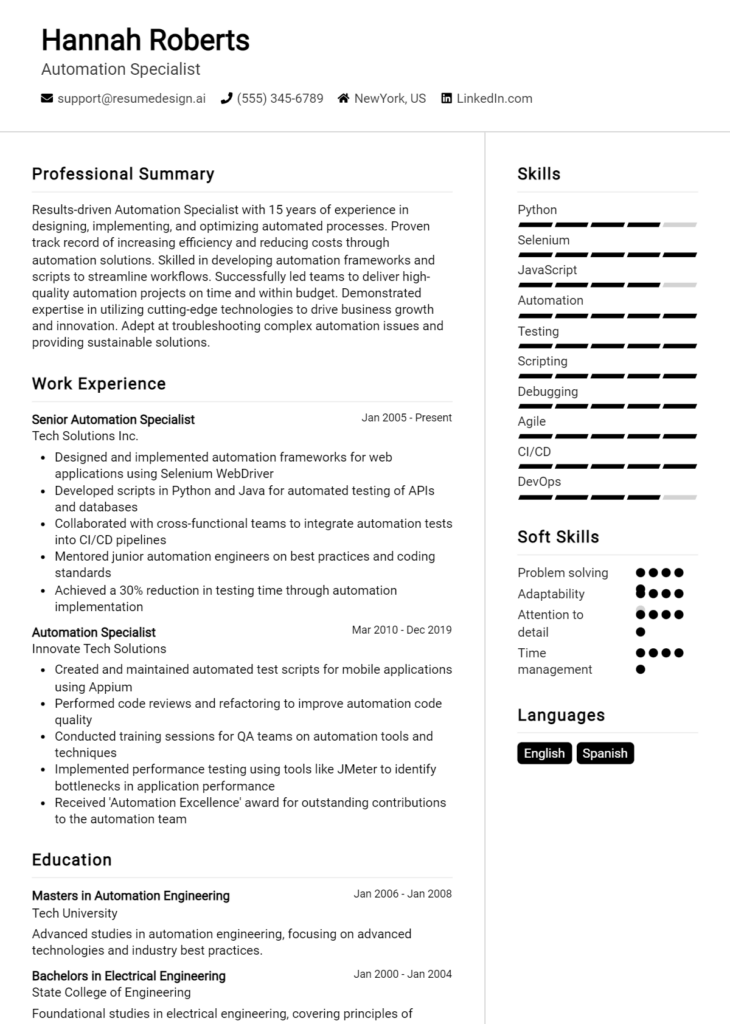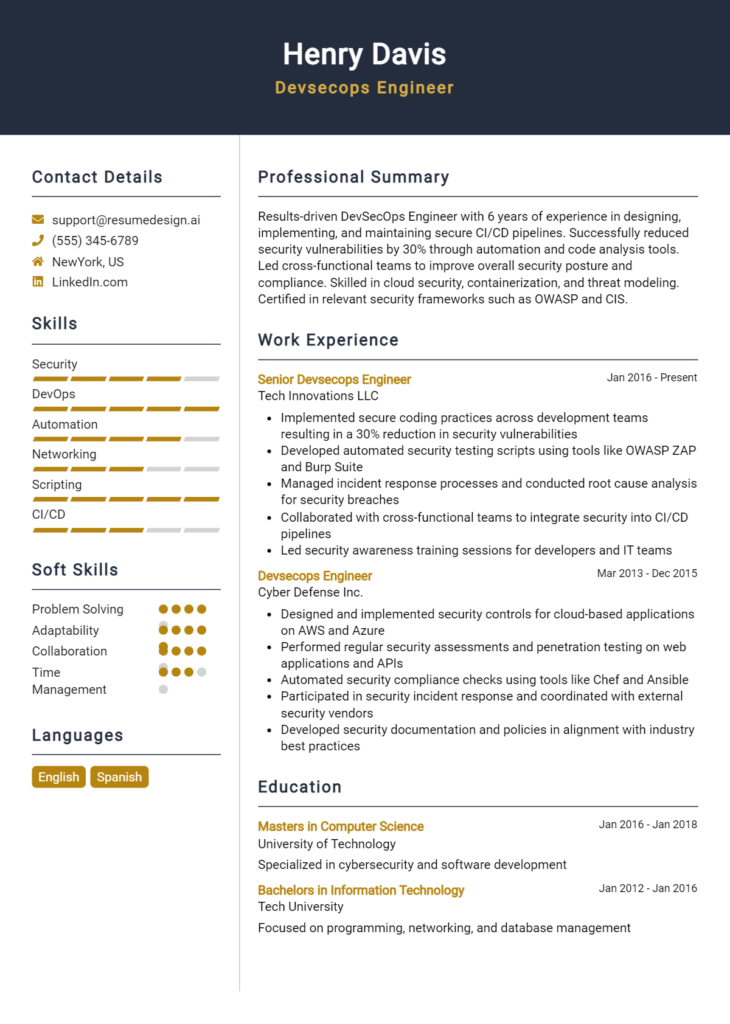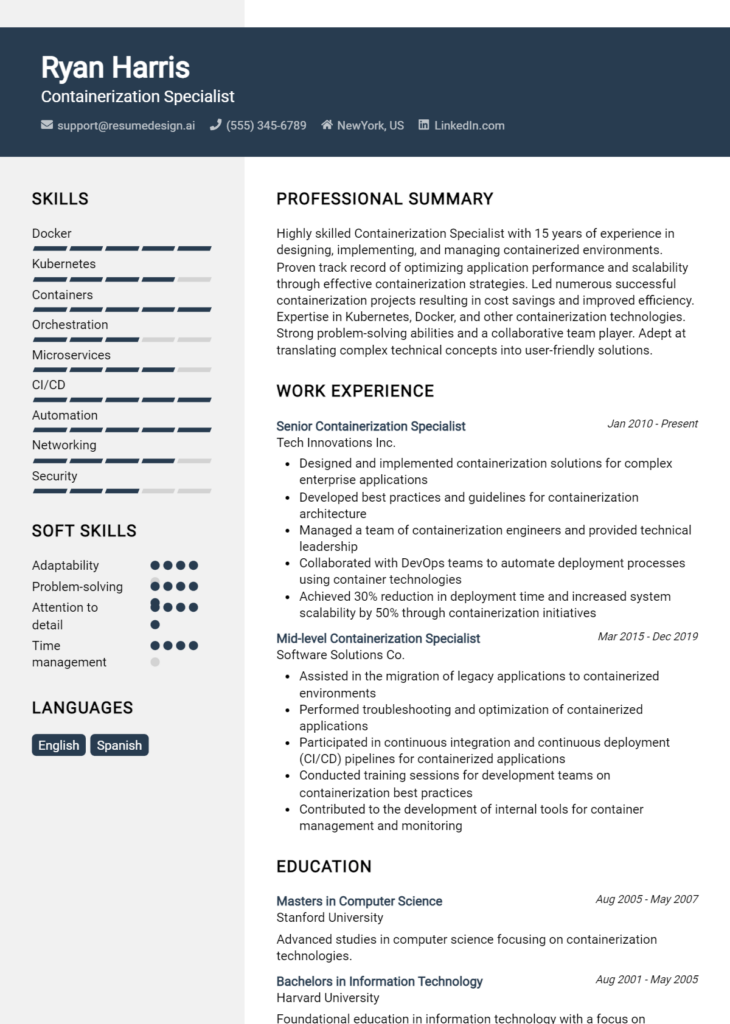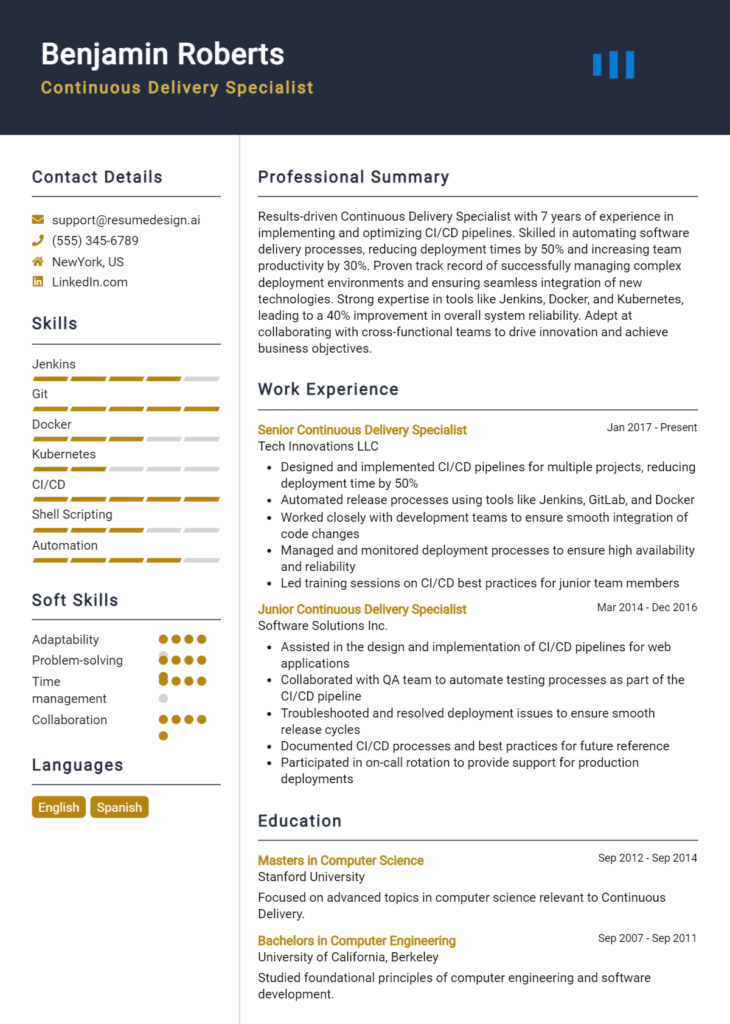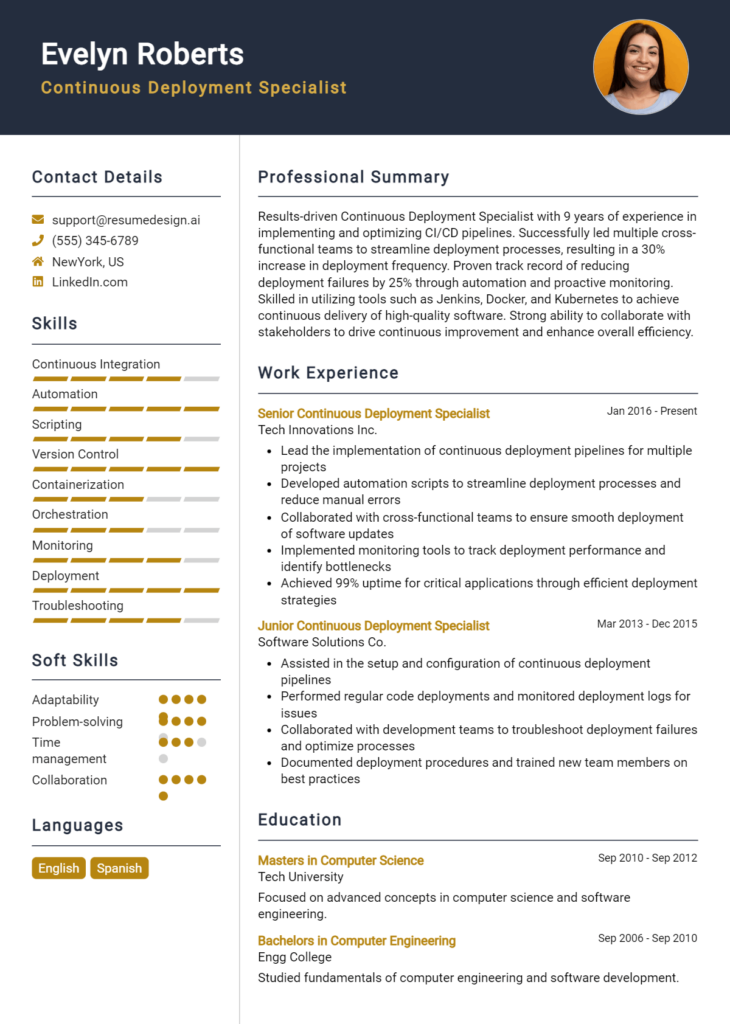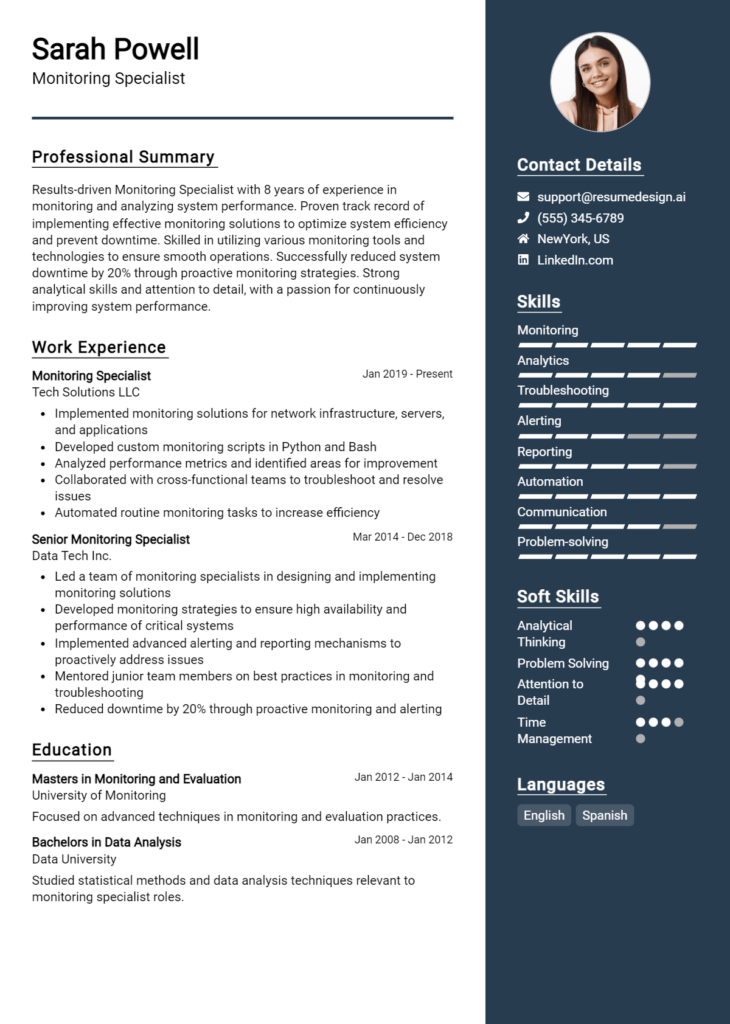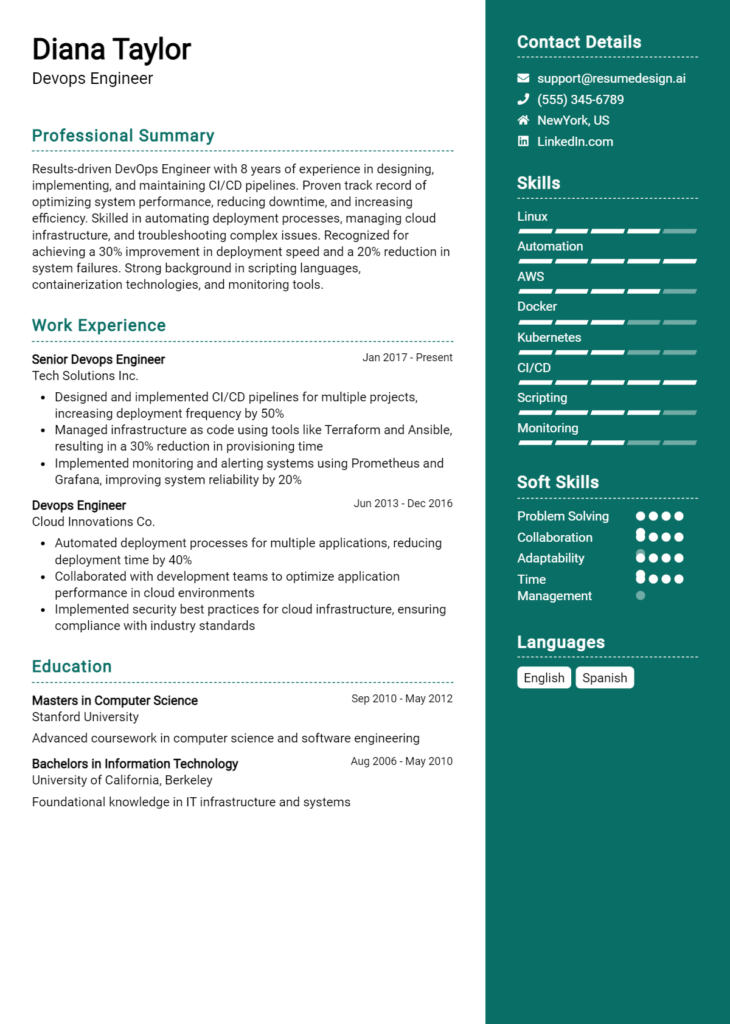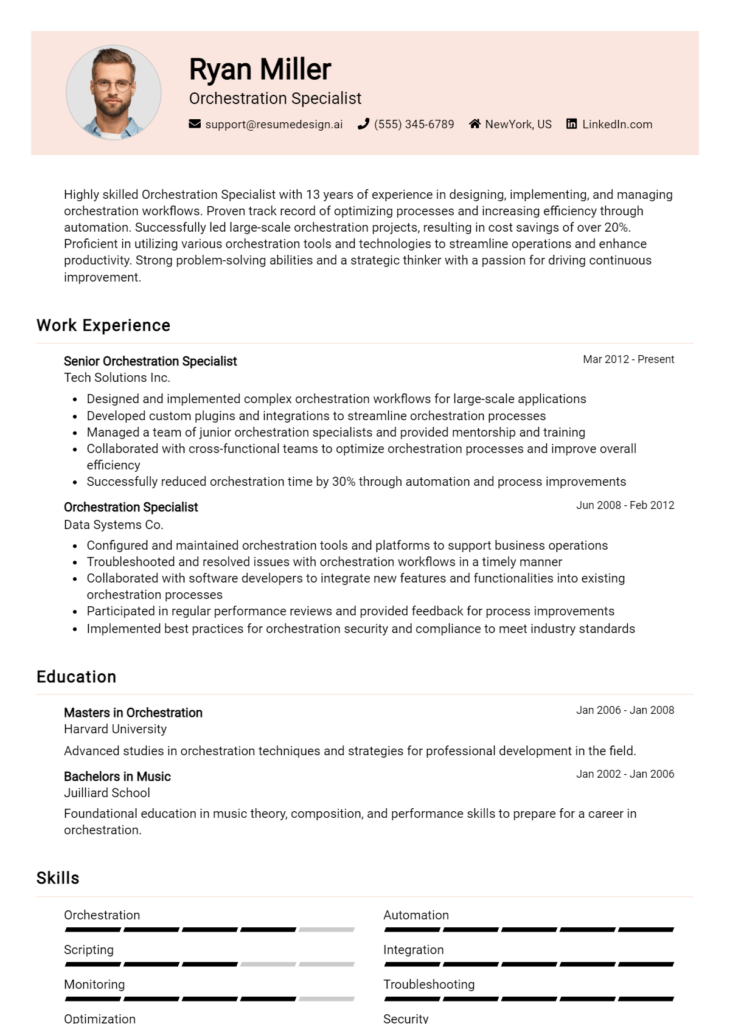Deployment Pipelines Specialist Core Responsibilities
A Deployment Pipelines Specialist plays a crucial role in ensuring seamless software delivery by bridging gaps between development, operations, and quality assurance teams. This professional is responsible for designing, implementing, and optimizing CI/CD pipelines, which requires strong technical skills in automation tools and cloud platforms. Problem-solving abilities are essential for troubleshooting issues that arise during deployment processes. A well-structured resume highlighting these qualifications not only demonstrates expertise but also showcases how these skills contribute to achieving the organization’s strategic goals.
Common Responsibilities Listed on Deployment Pipelines Specialist Resume
- Design and implement continuous integration and continuous deployment (CI/CD) pipelines.
- Collaborate with cross-functional teams to streamline deployment processes.
- Automate testing and deployment tasks to improve efficiency.
- Monitor and troubleshoot deployment issues to ensure minimal downtime.
- Utilize version control systems to manage code changes effectively.
- Document deployment processes and best practices for team reference.
- Evaluate and integrate new technologies to enhance pipeline performance.
- Provide training and support to team members on deployment tools.
- Analyze deployment metrics to identify areas for improvement.
- Ensure compliance with security and regulatory standards during deployments.
- Participate in post-deployment reviews to assess project success.
- Maintain up-to-date knowledge of industry trends and emerging tools.
High-Level Resume Tips for Deployment Pipelines Specialist Professionals
In the competitive landscape of tech roles, a well-crafted resume is crucial for Deployment Pipelines Specialist professionals looking to make a strong first impression on potential employers. Your resume serves as the initial touchpoint, showcasing your skills, achievements, and unique qualifications that set you apart from other candidates. It is essential that your resume not only highlights your technical expertise but also effectively communicates your accomplishments in streamlining deployment processes and enhancing efficiency. This guide will provide practical and actionable resume tips specifically tailored for Deployment Pipelines Specialist professionals, equipping you with the tools needed to create a compelling narrative that resonates with hiring managers.
Top Resume Tips for Deployment Pipelines Specialist Professionals
- Tailor your resume to the job description by incorporating relevant keywords and phrases that align with the specific requirements of the position.
- Highlight your experience with popular deployment tools and technologies such as Jenkins, Git, Docker, and Kubernetes.
- Quantify your achievements by using metrics and figures to showcase the impact of your work, such as reducing deployment times by a certain percentage.
- Include a dedicated skills section that lists both hard and soft skills relevant to deployment pipelines, such as automation, CI/CD practices, and teamwork.
- Showcase your problem-solving abilities by detailing specific challenges you faced in previous roles and how you successfully navigated them.
- Incorporate relevant certifications, such as AWS Certified DevOps Engineer or Docker Certified Associate, to enhance your credibility in the field.
- Use action verbs to begin bullet points in your experience section, emphasizing your proactive contributions to projects and processes.
- Maintain a clean, professional format that enhances readability and allows important information to stand out easily.
- Keep your resume concise, ideally one page, focusing on the most relevant experiences and skills that directly relate to the role.
By implementing these tips, Deployment Pipelines Specialist professionals can significantly increase their chances of landing a job in this dynamic field. A well-structured and tailored resume not only showcases your qualifications but also demonstrates your commitment to the role, making you an appealing candidate to potential employers looking for expertise in deployment processes.
Why Resume Headlines & Titles are Important for Deployment Pipelines Specialist
In the competitive landscape of technology and software development, a Deployment Pipelines Specialist plays a crucial role in ensuring the seamless integration and delivery of applications. Crafting a compelling resume headline or title is essential for candidates in this field, as it serves as the first impression for hiring managers. A strong headline can instantly capture attention and succinctly summarize a candidate's key qualifications, making it easier for employers to recognize their suitability for the role. It should be concise, relevant, and directly aligned with the job being applied for, effectively setting the stage for the rest of the resume.
Best Practices for Crafting Resume Headlines for Deployment Pipelines Specialist
- Keep it concise: Aim for one impactful sentence or phrase.
- Be specific: Use terminology and keywords relevant to deployment pipelines.
- Highlight key skills: Focus on the most relevant skills that align with the job description.
- Showcase accomplishments: Mention any significant achievements in the field.
- Tailor for the role: Customize the headline for each job application.
- Use action-oriented language: Incorporate strong verbs that convey expertise.
- Focus on results: Emphasize the impact of your work on previous projects.
- Avoid jargon: Ensure clarity and avoid overly technical language unless necessary.
Example Resume Headlines for Deployment Pipelines Specialist
Strong Resume Headlines
Experienced Deployment Pipelines Specialist with 5+ Years in CI/CD Automation
DevOps Engineer Specializing in Efficient Deployment Strategies and Process Optimization
Results-Driven Deployment Pipelines Expert with a Proven Track Record in Cloud Integrations
Certified Jenkins Administrator Focused on Streamlining Software Delivery Processes
Weak Resume Headlines
Job Seeker Looking for Opportunities
IT Professional with Various Skills
The strong headlines are effective because they clearly communicate the candidate's expertise, relevant experience, and specific focus areas, making it easy for hiring managers to identify their qualifications at a glance. In contrast, the weak headlines lack specificity and fail to convey any particular strengths or value propositions, ultimately blending into a sea of generic applications that are easily overlooked.
Writing an Exceptional Deployment Pipelines Specialist Resume Summary
A well-crafted resume summary is crucial for a Deployment Pipelines Specialist as it serves as the first impression for hiring managers. In an industry where technical expertise and project management skills are paramount, a strong summary succinctly encapsulates a candidate's key skills, relevant experience, and notable accomplishments. This brief introduction is essential for quickly capturing the attention of hiring managers, making it easier for them to see how your expertise aligns with their needs. It should be concise, impactful, and tailored specifically to the job being applied for, ensuring that the most pertinent information stands out right from the start.
Best Practices for Writing a Deployment Pipelines Specialist Resume Summary
- Quantify achievements where possible to showcase the impact of your work.
- Focus on key skills relevant to deployment pipelines, such as CI/CD, automation, and cloud technologies.
- Tailor your summary to align with the specific job description and company culture.
- Use action verbs to convey a sense of proactivity and results-driven mindset.
- Highlight relevant certifications or technologies you are proficient in.
- Keep it concise—ideally between 3 to 5 sentences—to maintain the reader's attention.
- Include soft skills that complement your technical abilities, such as teamwork and problem-solving.
- Avoid jargon that may not be universally understood; clarity is key.
Example Deployment Pipelines Specialist Resume Summaries
Strong Resume Summaries
Results-oriented Deployment Pipelines Specialist with over 5 years of experience in implementing CI/CD strategies that reduced deployment times by 40%. Proficient in Jenkins, Docker, and Kubernetes, with a proven track record of enhancing automated workflows and improving system reliability.
Dynamic DevOps professional skilled in designing and optimizing deployment pipelines, leading to a 30% increase in release frequency. Certified in AWS and Azure, with expertise in scripting and automation tools that streamline processes and reduce operational costs.
Detail-oriented Deployment Pipelines Specialist with a focus on cloud-native solutions, having successfully migrated over 20 applications to AWS, resulting in a 50% decrease in infrastructure costs. Strong background in collaboration with cross-functional teams to drive continuous improvement.
Weak Resume Summaries
Experienced in deployment pipelines and related technologies. I work well in teams and have done various projects.
A Deployment Pipelines Specialist with knowledge of automation tools. Looking for a job to further my career in the tech industry.
The strong resume summaries are considered effective because they provide specific, quantifiable results, highlight relevant skills, and demonstrate direct applicability to the role of a Deployment Pipelines Specialist. In contrast, the weak summaries lack detail and clarity, making them too vague and generic. They fail to convey a sense of achievement or specific expertise, which is essential in a competitive job market.
Work Experience Section for Deployment Pipelines Specialist Resume
The work experience section of a Deployment Pipelines Specialist resume is crucial as it serves as a showcase for the candidate's technical skills, team management capabilities, and ability to deliver high-quality products efficiently. This section allows potential employers to assess how the candidate has applied their knowledge in real-world scenarios, emphasizing the importance of quantifying achievements to demonstrate impact. Aligning work experience with industry standards not only highlights the candidate's expertise but also their understanding of best practices in deployment pipelines, making them a strong contender for the role.
Best Practices for Deployment Pipelines Specialist Work Experience
- Highlight specific technical skills relevant to deployment pipelines, such as CI/CD tools (Jenkins, GitLab CI) and scripting languages (Python, Bash).
- Quantify achievements with metrics, such as deployment frequency, reduction in deployment time, or percentage of failed deployments.
- Include details on collaboration with cross-functional teams, showcasing communication and teamwork abilities.
- Demonstrate leadership by outlining roles in mentoring junior staff or leading project teams.
- Align experience descriptions with industry standards and keywords to optimize visibility in applicant tracking systems.
- Showcase problem-solving skills by detailing challenges faced and the innovative solutions implemented.
- Provide context for each experience, explaining how tasks contributed to overall project success or business goals.
- Use action verbs to convey a sense of initiative and impact in each role.
Example Work Experiences for Deployment Pipelines Specialist
Strong Experiences
- Led a team of 5 in implementing a CI/CD pipeline that reduced deployment time by 40%, significantly improving the development lifecycle.
- Developed automated testing scripts that decreased the rate of production bugs by 30%, enhancing overall product quality.
- Collaborated with cross-functional teams to integrate microservices architecture, resulting in a 25% increase in scalability and system performance.
- Managed a project that successfully migrated legacy systems to a modern deployment platform, achieving a 50% reduction in server costs.
Weak Experiences
- Worked on deployment processes with little detail on contributions or outcomes.
- Involved in team meetings to discuss project status without highlighting any specific role or achievements.
- Assisted in the implementation of CI/CD practices without quantifying the impact or improvements made.
- Participated in a project that involved deployment without specifying responsibilities or results.
The examples provided illustrate the distinction between strong and weak experiences. Strong experiences are characterized by clear, quantifiable outcomes that showcase technical expertise and leadership, while weak experiences lack specific details and measurable results, which fail to convey a candidate's impact or contributions effectively. Highlighting tangible achievements and collaboration in the work experience section can significantly enhance a resume's effectiveness for a Deployment Pipelines Specialist role.
Education and Certifications Section for Deployment Pipelines Specialist Resume
The education and certifications section of a Deployment Pipelines Specialist resume is crucial as it showcases the candidate's academic background, relevant certifications, and commitment to continuous learning in a rapidly evolving field. This section demonstrates not only the foundational knowledge gained through formal education but also highlights industry-recognized certifications and specialized training that are essential for success in deployment pipeline management. By providing relevant coursework and advanced credentials, candidates can significantly enhance their credibility and align themselves more closely with the specific demands of the job role.
Best Practices for Deployment Pipelines Specialist Education and Certifications
- Include only relevant degrees and certifications that pertain to deployment pipelines, software development, or DevOps practices.
- List certifications in order of relevance, focusing on those that are widely recognized in the industry.
- Provide specific details about relevant coursework that demonstrates expertise in tools, technologies, or methodologies used in deployment pipelines.
- Highlight any specialized training or workshops attended that relate to continuous integration and continuous deployment (CI/CD) practices.
- Emphasize achievements that resulted from your education and certifications, such as successful projects or processes improved.
- Keep the section concise yet informative, ensuring clarity and easy readability for hiring managers.
- Regularly update this section to reflect new certifications or courses completed to showcase ongoing professional development.
- Utilize industry-standard acronyms and terminology to align with job descriptions and demonstrate familiarity with the field.
Example Education and Certifications for Deployment Pipelines Specialist
Strong Examples
- Bachelor of Science in Computer Science, XYZ University, 2021
- Certified Kubernetes Administrator (CKA), 2022
- AWS Certified DevOps Engineer – Professional, 2023
- Relevant Coursework: Continuous Integration/Continuous Deployment (CI/CD), Cloud Computing, and Software Engineering Principles
Weak Examples
- Associate Degree in Fine Arts, ABC College, 2019
- Microsoft Office Specialist Certification, 2018
- Outdated CompTIA A+ Certification, 2015
- General Computer Skills Course, 2020
The examples provided are considered strong because they directly relate to the skills and knowledge required for a Deployment Pipelines Specialist, showcasing relevant degrees, certifications, and coursework that align with industry standards. In contrast, the weak examples reflect qualifications that are either outdated, irrelevant to the role, or do not demonstrate specialized knowledge necessary for success in deployment pipeline management, which could detract from the candidate's overall appeal to potential employers.
Top Skills & Keywords for Deployment Pipelines Specialist Resume
A well-crafted resume for a Deployment Pipelines Specialist is crucial for showcasing the essential skills that make a candidate stand out in a competitive job market. The right blend of hard and soft skills not only demonstrates technical proficiency but also highlights the interpersonal abilities necessary for collaboration in a fast-paced environment. Employers are increasingly looking for candidates who can effectively navigate the complexities of deployment processes while working seamlessly with cross-functional teams. By emphasizing these skills, candidates can better position themselves as valuable assets to prospective employers.
Top Hard & Soft Skills for Deployment Pipelines Specialist
Soft Skills
- Strong communication
- Team collaboration
- Problem-solving
- Adaptability
- Attention to detail
- Critical thinking
- Time management
- Conflict resolution
- Creativity
- Initiative
Hard Skills
- Continuous Integration/Continuous Deployment (CI/CD) practices
- Version control systems (e.g., Git)
- Automation tools (e.g., Jenkins, CircleCI)
- Cloud platforms (e.g., AWS, Azure, Google Cloud)
- Containerization (e.g., Docker, Kubernetes)
- Infrastructure as Code (IaC) tools (e.g., Terraform, Ansible)
- Monitoring and logging tools (e.g., Prometheus, ELK Stack)
- Scripting languages (e.g., Python, Bash)
- Networking fundamentals
- Agile and DevOps methodologies
For a deeper dive into how to effectively highlight these skills and to ensure your work experience complements your qualifications, consider refining your resume to reflect these key areas.
Stand Out with a Winning Deployment Pipelines Specialist Cover Letter
I am excited to apply for the Deployment Pipelines Specialist position at your esteemed organization. With a strong background in software development and DevOps practices, I possess the technical skills and collaborative mindset necessary to streamline deployment processes and enhance operational efficiency. My experience in creating and managing CI/CD pipelines has equipped me with the ability to automate deployments, reducing time-to-market while maintaining high-quality standards.
In my previous role at [Previous Company Name], I successfully implemented a robust deployment pipeline that improved release cycles by 40%. By leveraging tools such as Jenkins, Docker, and Kubernetes, I streamlined the deployment process, minimized errors, and facilitated seamless integration across teams. My commitment to continuous improvement and proactive problem-solving enabled our team to deliver features faster, ultimately enhancing user satisfaction and driving business growth.
I pride myself on my ability to work closely with cross-functional teams, bridging the gap between development and operations. My strong communication skills allow me to articulate complex technical concepts to non-technical stakeholders effectively, ensuring everyone is aligned on project goals. I am passionate about fostering a culture of collaboration and innovation within teams, empowering colleagues to embrace best practices in deployment and operations.
I am eager to bring my expertise in deployment pipelines to [Company Name] and contribute to your mission of delivering exceptional software solutions. I look forward to the opportunity to discuss how my skills and experiences align with your needs, and how I can help drive the success of your deployment strategies. Thank you for considering my application.
Common Mistakes to Avoid in a Deployment Pipelines Specialist Resume
When crafting a resume for a Deployment Pipelines Specialist position, it's crucial to present your skills and experience effectively. Many candidates, however, make common mistakes that can undermine their chances of landing an interview. A well-structured resume that avoids these pitfalls can significantly enhance your appeal to potential employers. Here are some common mistakes to watch out for:
Vague Job Descriptions: Failing to provide specific details about your previous roles can leave hiring managers uncertain about your actual responsibilities and accomplishments. Use action verbs and quantify your achievements.
Ignoring Keywords: Many companies use automated systems to filter resumes. Not including relevant keywords from the job description can result in your resume being overlooked.
Overloading with Technical Jargon: While it's essential to demonstrate your technical expertise, using excessive jargon can alienate hiring managers who may not be as familiar with specific tools or technologies.
Lack of Tailoring: Submitting a generic resume for each application can hurt your chances. Tailor your resume to highlight the skills and experiences that align most closely with the specific job requirements.
Neglecting Soft Skills: Technical skills are important, but soft skills like teamwork, communication, and problem-solving are equally vital in a Deployment Pipelines Specialist role. Be sure to showcase these attributes.
Formatting Issues: A cluttered or poorly organized resume can be difficult to read and may distract from your qualifications. Use clear headings, bullet points, and consistent formatting to improve readability.
Not Showcasing Continuous Learning: The tech landscape is constantly evolving. Failing to mention any recent certifications, courses, or self-study can suggest that you are not keeping up with industry trends.
Omitting Results and Impact: Simply listing duties without demonstrating the impact of your work can make your contributions seem less significant. Whenever possible, include metrics or outcomes that reflect your success in previous roles.
Conclusion
As we conclude our exploration of the Deployment Pipelines Specialist role, it's essential to highlight the critical skills and responsibilities that define this position. From automating deployment processes to ensuring seamless integration and continuous delivery, a Deployment Pipelines Specialist plays a pivotal role in enhancing software development efficiency. The ability to work with various tools and technologies, such as CI/CD pipelines, version control systems, and cloud platforms, is crucial for success in this role.
Moreover, soft skills such as problem-solving, collaboration, and communication are equally important, as specialists often work closely with development and operations teams to streamline workflows. Staying updated with industry trends and best practices will also help you stand out in this competitive field.
Now that you have a clearer understanding of the Deployment Pipelines Specialist role, it’s time to reflect on your own qualifications and experiences. Take a moment to review your resume to ensure it accurately highlights your relevant skills and achievements.
To assist you in crafting a compelling resume, consider utilizing available resources such as resume templates, which can provide a solid foundation for your application. You can also leverage a resume builder for a more personalized touch or explore resume examples to gather inspiration from successful candidates. Additionally, don’t forget to check out cover letter templates to complement your resume and make a strong impression on potential employers.
Take action today and refine your resume to better align with the demands of the Deployment Pipelines Specialist position!

